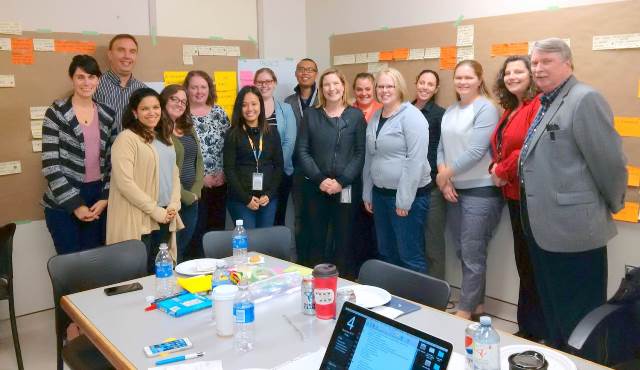Reduction to inpatient medicine length of stay shows significant benefit to patient access and flow at London Health Sciences Centre
By Maurice Williams and Sarah Muto
In F2013/14, London Health Sciences Centre (LHSC) data indicated that on average the health care centre was continually running over census, with 115-120 per cent capacity most days, and with surges of up to 130 per cent. These capacity issues directly affected climbing lengths of stay in the Emergency Department Staff and physicians were burned out from the bed pressures, and work needed to be done.
Patients in the emergency department waiting for a medicine bed were one of the largest factors contributing to long emergency department lengths of stay. “We recognized that something needed to change,” says Dr. Jim Calvin, Chair Chief Medicine, LHSC. “But we lacked the clear data to understand where the bottlenecks in the system were.”
The Department of Medicine created a strategic plan, trained their physicians and clinical staff on Lean Six Sigma and held a retreat to develop an improvement plan for long lengths of stay on the medicine inpatient unit. The understanding was that a number of initiatives needed to be trialed in PDSA (Plan-Do-Study-Act) cycles to try and address the issue.
“The goal of the work wasn’t to simply turn beds over faster, it was about making quality improvements to the patient’s journey of care,” says Sherri Lawson, Director, Inpatient Medicine, LHSC from 2012 – 2017.
In the fall of 2015, a series of Kaizen events were held with inpatient medicine staff and physicians, and supported by hospital process improvement consultants. Value stream maps were created and a significant amount of wastes in their processes were identified. Opportunities were then prioritized to reduce patient days through a number of initiatives which began in 2016, including; white board usage, bed assignment process, bullet rounds, seven day a week Allied Health, patient education, medicine post discharge support including follow-up phone calls, patient mobility, and pharmacy medication reconciliation done at admission and discharge. Patient Oriented Discharge Summary (PODS) and discharge checklists were also piloted.
To manage these concurrent initiatives, hospital leadership and physicians continued to engage in house project management, process improvement, and decision support resources to keep initiatives on track, ensure sound process improvement methodologies were used, and to validate outcomes.
The result of implementing each of these initiatives have been measured independently, but the collective result in the UH Medicine program was a reduction of the average acute length of stay by 1.1 days and a concurrent reduction in the 30-day all cause urgent readmission by 1.0%. Overall the 90th percentile for Emergency Department length of stay at University Hospital went from worst performing in F2014/15 (34.73 hours) to best in F2016/17 (16.40 hours) amongst peer teaching hospitals in Ontario. Victoria Hospital also saw remarkable improvements from 29.97 hours in F2014/15 to 24 hours in F2016/17.
Impact to patient access and flow has been significant, and the overall quality of care for patients has also been enhanced. “Through our efforts, our discharges are better prepared and transitional care is improved,” says Calvin.
The Medicine program still recognizes that they have more to do. “I always think we can do better,” says Calvin. “These efforts have been instrumental in demonstrating what can be done with a little effort, open minds, and teamwork.”
Next up for the department is a focus on; a balanced scorecard by department, division, team and the individual, moving patient oriented discharge summary (PODS) and physician checklists to electronic formats with the support of our Information Technology Infrastructure department, and finally, a renewed focus ion Quality Based Procedures (QBPs) throughout the department.
“Our focus needs to be on continuing to create innovations in quality and process improvement,” says Calvin. “Patience is necessary, but you need to set a high standard for yourself and your organization.”
Maurice Williams is a Process Improvement Consultant, and Sarah Muto a Project Consultant at London Health Sciences Centre.


